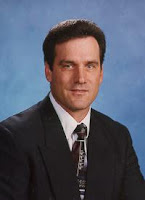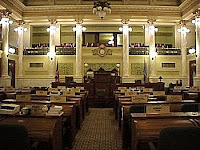It's not a pretty place to be -- caught between the jackass and dumbo. But that's where more and more of us choose to be. The plight of the political Independent is among the topics served up this time by Spearfish free-lance writer Lorraine Collins. It should be required reading for South Dakota politicians of every stripe.
Us or Them
Lorraine Collins
-
I talked to a fellow the other day who served in our state legislature about a decade ago, representing an East River district. He had been elected as a Republican but when he got to Pierre he was made uneasy by the partisanship he found there. He thought he was supposed to represent everybody in his district, not just Republicans. He soon found out that the most important thing in the Legislature was what party you belong to. Members of the two political parties had different colored name badges just to make sure that they could instantly be identified so nobody would accidentally talk to a member of the other party without knowing it. And they sat in segregated areas of the House chamber, separated by an aisle. The two parties caucused separately to discuss upcoming legislation. The entire atmosphere, so far as he was concerned, was one promoting division and confrontation, rather than cooperation and problem solving.
-
He just might have put his finger on something that is beginning to be recognized as a problem throughout the country. In this interminable election season, we have heard a lot about a desire to change the tone of voice in America by promoting unity and cooperation instead of division and rancor. There has even been the rumored possibility of an Independent candidate because people are so fed up with partisan gridlock in Washington. Of course, it doesn't matter whether the next president is an Independent or not, so long as Congress is made up of warring factions locked in fierce partisan battles.
-
This does cause one to stop and think about why political parties exist at all, and why we are supposed to be blindly loyal to them or be cast into outer darkness. If you are an elected official who disagrees with your party's position on an issue you are a “maverick” and will be punished for it. You don't get good committee assignments or a preferred seat in the Legislature if you think for yourself and don't play along. I suppose this is how political parties keep their power over individual members, and power is what parties are all about.
-
So what is a person to do if she's not nuts about either the Republicans or the Democrats? Are Independents supposed to just sit down and shut up and let the parties slug it out? During this primary season we've heard of several states where people who are not affiliated with any political party were allowed to vote in the primary elections, and I've always liked that idea. I think it makes sense. If political parties don't care what you think because you're not a member of their group, then how can they try to win your vote come November? I was able to vote in primaries when I lived in a couple of other states without declaring what party I might be a member of, if any, and I liked that. I don't suppose that will ever happen in South Dakota.
-
It's hard to imagine an American political landscape without the two historic parties we've had for so long, and I wouldn't expect them to vanish. All of the structure of our government, whether in legislative or executive branches, seems predicated on the assumption that people bear one label or another. But still, the public is beginning to wonder what political parties contribute to the strength of the nation and the propagation of our long held ideals. Do they help us deal with our mutual problems and achieve our mutual aspirations, or do they promote division and conflict? I just ask the question because somehow, in today's political climate, “We the people” often seems to have changed to “Us or them.”
------------------------------------------------------------------------------
Free-lance writer Lorraine Collins lives in Spearfish.
 It won’t be happening anytime soon, but a full-service South Dakota Public Broadcasting FM radio station is being planned for the northern Black Hills. It would be located in Spearfish.
It won’t be happening anytime soon, but a full-service South Dakota Public Broadcasting FM radio station is being planned for the northern Black Hills. It would be located in Spearfish. The transmitter for the Spearfish station will be located at an existing tower site in north Spearfish. You may click on the map at left to see a larger image of the planned coverage area. Programming will duplicate KUSD-FM, the SDPB flagship station at the University of South Dakota in Vermillion.
The transmitter for the Spearfish station will be located at an existing tower site in north Spearfish. You may click on the map at left to see a larger image of the planned coverage area. Programming will duplicate KUSD-FM, the SDPB flagship station at the University of South Dakota in Vermillion.











